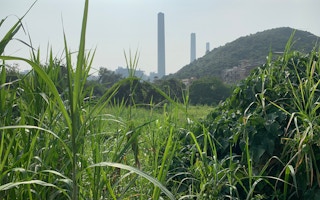In 2017, the report Better Business, Better World by the United Nations-backed Business and Sustainable Development Commission (BSDC) found that Asian corporations would be missing out on US$5 trillion in business opportunities if they ignored the business potential of solutions that address key sustainable development issues such as water scarcity, deforestation and air pollution.
To continue reading, subscribe to Eco‑Business.
There's something for everyone. We offer a range of subscription plans.
- Access our stories and receive our Insights Weekly newsletter with the free EB Member plan.
- Unlock unlimited access to our content and archive with EB Circle.
- Publish your content with EB Premium.
The report pushed for Asian companies to think harder about how to build their businesses in support of the UN’s Sustainable Development Goals (SDGs), a series of ambitions to set the world on a more equitable and less environmentally destructive path by the end of this decade.
However, a report published the following year by the UN found that Asia is on track to achieve just 20 of the SDGs’ 57 targets, with no progress made in protecting the oceans and forests, reducing inequality or climate action.
Finance will play a pivotal role in achieving the SDGs, which the UN estimates will cost a total of US$11.5 trillion by 2030, including US$1.4 trillion a year just to achieve SDG 1, ending poverty for 700 million people, the majority of whom live in Asia.
So how can Asia unlock capital for sustainable development, at a time when investor funds are still not being paired with bankable projects, and sustainable finance activity is not happening fast enough to address issues like climate change that will hurt Asia, particularly the poorer countries in the region, more than anywhere on the planet?
“
There is still a hesitance to deploy capital because investors are concerned the returns don’t justify the perceived risk.
Regula Schegg, managing director, Asia, Circulate Capital
On 26 March, Eco-Business, in partnership with United Nations Environment, will be staging an event, Unlocking Capital for Sustainability, to answer that very question. As the conference approaches, Eco-Business asked four key speakers what they think is holding sustainable finance back in Asia.
Vivek Pathak, regional director, East Asia and Pacific, International Finance Corporation

Vivek Pathak, regional director, East Asia and Pacific, IFC
Many investors are justifiably questioning what constitutes a sustainable investment. The green movement started decades ago, yet there is still no standard global definition to help investors make educated decisions about where to put their money.
IFC has recognised the need for standards and common definitions and has led the way, playing a key role in the Sustainable Banking Network, and developing the Equator Principles, Green Bond Principles, and Operating Principles for Impact Management.
There is also a need to change the timeline we use to measure stocks. Quarterly results impact their value but the returns on sustainable investments can be longer term, which isn’t popular. Green buildings are a good example.
As Asia rapidly urbanises, they represent a US$17 trillion investment opportunity. They may take longer and be slightly more expensive to build but over time, with significantly lower energy costs, coupled with fossil fuels becoming ever more expensive, green buildings will reap the benefits. It simply makes good business to construct green buildings now.
Ultimately, as more investors seek to invest sustainably, and governments seek to transition to low carbon economies, market forces will drive finance towards sustainable investments.
Regula Schegg, managing director, Asia, Circulate Capital

Regula Schegg, MD, Asia, Circulate Capital
Particularly in the industry we are in, which is the circular economy and recycling/waste management sector, there is still significant hesitance to deploy capital because investors, whether public or private, are concerned the returns don’t justify the perceived risk.
Investors need to see three things that are often lacking in the space. First, a track record – they want to see evidence that competitive returns can be generated; second, pipeline – visibility to sound, reasonably sized investable opportunities; third, there need to be easy ways for different investors to participate. We need more and differentiating investment vehicles to fit the investor’s needs.
“
It still holds true that sustainable development projects and goals remain challenging to finance.
Mikkel Larsen, chief sustainability officer, DBS Bank
Our goal at Circulate Capital is to unlock capital to stop ocean plastic. In order to achieve this goal, we are addressing these three challenges to prove that investing in the circular economy and the recycling and waste management sector is scalable and can generate attractive returns with impact.
Mike Ng, head of structured finance, OCBC Bank

Mike Ng, head of structured finance, OCBC
While banks are eager to provide sustainable finance, the constraint often is the availability of bankable sustainable projects. In Asia, there are many countries with emerging economies, and project development requires sizeable capital commitments, often from international investors and banks.
Investments in emerging markets entail various forms of risk. In renewable energy, for instance, the project off-taker (who buys the electricity) is typically a government-owned entity, which may not be of investment-grade. The risk is further compounded by issues commonly faced in emerging markets, including foreign exchange mismatch, uncertainty in the legal and regulatory environments, and risks of expropriation and currency transferability. All these factors make implementation of sustainable projects challenging in emerging markets, from a bankability perspective.
Without a common framework across emerging markets to enhance bankability of sustainable projects, there will be a limit to the quantum of sustainable finance that financial institutions can provide.
Mikkel Larsen, chief sustainability officer, DBS Bank

Mikkel Larsen, chief sustainability officer, DBS Bank
There has been strong sustainable financing momentum across the world, including in Asia.
The primary condition for any type of financing is that the project must be financially viable. DBS and UN Environment’s joint report on green finance opportunities in Asean from 2018 identified a funding gap of US$3 trillion over the next 15 years. The report also outlined sectors more financially viable than others. While the picture may have changed favourably in some sectors, it still holds true that sustainable development projects and goals remain challenging to finance.
Some of the challenges include the lack of small-to-medium sized business financing, lack of coherent financial policy frameworks, structural features of the Asean financial system, insufficient environmental disclosures and the lack of taxonomy. In addition, a lack of pricing of environmental externalities (including carbon pricing) is an ongoing issue that needs a practical solution.
However, as the industry is in a nascent stage of growth, it is encouraging to see progress being made on many of these fronts. Singapore as a financial hub also plays an integral role in spearheading the region’s sustainability financing solutions.
Regula Schegg, Mike Ng, Mikkel Larsen and Vivek Pathak will be speaking at Unlocking Capital for Sustainability, Eco-Business’s upcoming conference in partnership with United Nations Environment, on 26 March 2020 at the Orchard Hotel in Singapore.














